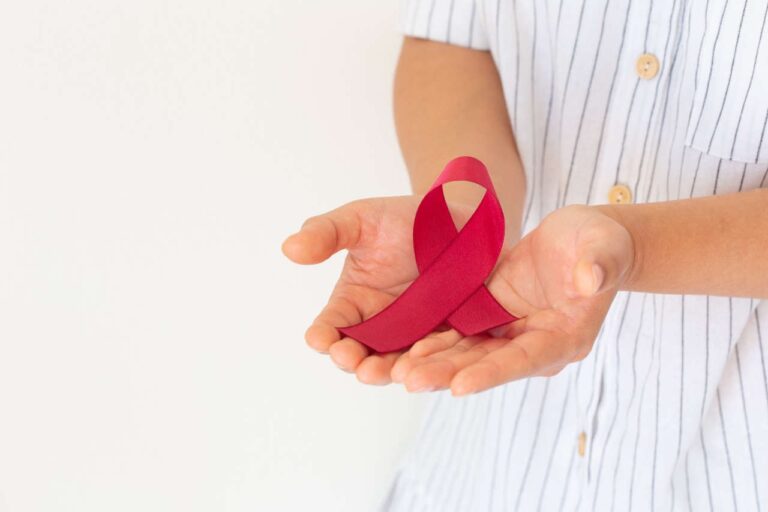
If you are undergoing treatment for breast cancer, then Trodelvy can be an option for specific breast cancers. According to studies, it is more effective in fighting certain types of breast cancers than other available medications and can increase your overall life expectancy.
In this article, we will explore everything you need to know about Trodelvy, including its uses, dosing, side effects, cost, and much more.
Get Financial Assistance
What Is Trodelvy?
Trodelvy (sacituzumab govitecan-hziy) is a cancer medicine used to treat two types of breast cancer.
The FDA first approved this drug on April 22, 2020, to treat adults with triple-negative breast cancer. Later, on February 3, 2023, the FDA approved this drug to treat adults with HR-positive, HER2-negative breast cancer (HR+/HER2-) [1].
You can only receive Trodelvy infusions after receiving at least two other treatments. Several studies have shown that this drug can increase the time before your cancer progresses and increase your life expectancy.
This drug works by targeting and binding to a protein present on the surface of the cancer cells, delivering chemotherapy medication into the cancer cells and killing them. This targeted approach also minimizes side effects.
What Is Trodelvy Used To Treat?
Trodelvy is an FDA-approved brand-name cancer medicine. Trodelvy uses include the treatment of the following cancers that have spread locally (locally advanced) or in other parts of the body (metastatic) and cannot be removed by surgery [2]:
Triple-Negative Breast Cancer: Before using Trodelvy, you have to try at least two other treatments, one of which should be for metastatic cancer.
Hormone Receptor-Positive and Human Epidermal Growth Factor Receptor 2-negative (HR+/HER2-) Breast Cancer: Before using Trodelvy, you have to try endocrine-based therapy and at least two other treatments for the metastatic cancer.
How Does Trodelvy Work?
Trodelvy is a cancer medicine that contains an antibody and an anticancer drug called SN-38. It works differently than traditional chemotherapy drugs. Many breast cancer cells have a large amount of protein called Trop-2 on the outside.
The antibody part of Trodelvy infusions targets and attaches to this Trop-2 protein of cancer cells. Once attached, it delivers the anticancer drug SN-38 directly into the cancer cells.
This targeted approach allows this medication to effectively kill the cancer cells while minimizing damage to the normal, healthy cells to reduce side effects [2].
Side Effects
Like any other medication, Trodelvy has side effects, some of which can be severe. These are some common and severe side effects of this medication [3]:
Common Side Effects
Common side effects of Trodelvy include:
- Low white blood cell count
- Feeling tired or weak
- Anemia
- Loss of appetite
- Changes in kidney function test
- Hair loss
- Increased sugar levels in the blood
- Diarrhea
- Decreased levels of potassium, magnesium, and sodium in the blood
Speak to a Specialist
About Copay Assistance
Severe Side Effects
Trodelvy can also cause some severe side effects. Some of the severe side effects of using Trodelvy for breast cancer are:
Severe Neutropenia: In this condition, you have an abnormally low level of white blood cells, which can lead to life-threatening infections. During your Trodelvy treatment, your doctor will regularly monitor your white blood cell counts. If your white blood cell count is too low, your doctor might lower your Trodelvy dose. In some cases, your doctor might stop your treatment.
Severe Diarrhea: Diarrhea is common with Trodelvy treatment. Sometimes, it can be severe. Diarrhea can cause dehydration and kidney problems. Inform your doctor right away if you encounter diarrhea.
Allergic Reactions: This medicine can cause severe, life-threatening allergic reactions. These reactions typically occur within 24 hours of Trodelvy infusion. Symptoms include rash, itching, hives, fever, difficulty breathing, dizziness, chills, and swelling of your face, lips, tongue, or throat.
Nausea and Vomiting: Trodelvy can cause nausea and vomiting, which is common, and sometimes they can be severe. To help you manage nausea and vomiting, your doctor will prescribe you some medicines.
Please note that this is not a list of all possible side effects. Contact your doctor if you encounter any side effects after your Trodelvy infusion.
What Are the Clinical Benefits of Trodelvy?
Trodelvy offers significant benefits to certain types of breast cancer patients compared to standard treatment. In a clinical trial involving 529 patients with metastatic or locally advanced triple-negative breast cancer who received two or more prior treatments, Trodelvy was compared to standard chemotherapy treatment. Researchers found that patients who received infusions lived an average of 4.8 months without disease progression.
However, patients who received standard chemotherapy treatment only lived an average of 1.7 months without disease progression. Patients who took Trodelvy lived an average of 11.8 months longer compared to 6.9 months for those who took standard treatment [2].
In another study, Trodelvy was compared to standard chemotherapy treatment in 543 patients with HER2-negative, HR-positive breast cancer who previously had at least two treatments and an endocrine-based therapy.
According to research findings, Trodelvy users lived an average of 5.5 months before disease progression, compared to 4 months for those receiving standard chemotherapy. Those receiving infusions lived an average of 14.4 months longer, while those receiving standard chemotherapy lived 11.2 months longer [2].
Dosing
You can receive Trodelvy as an intravenous infusion. The typical dosage of Trodelvy for breast cancer treatment is 10 mg per kilogram of your body weight.
Your doctor will give you Trodelvy once each week, on day 1 and day 8 of a 21-day treatment cycle. This treatment will continue until your disease worsens or side effects become too severe [2].
The first infusion will take about 3 hours to complete, and home infusions after that will take about 1 to 2 hours. Before each treatment, your doctor may recommend additional medicines to prevent infusion reactions, nausea, and vomiting.
Your doctor will monitor you during the infusion and at least 30 minutes after it finishes. Your doctor might adjust your Trodelvy dose or stop the treatment to manage side effects.
Get Copay Assistance Now
Trodelvy Cost
Trodelvy is available as a powder for injection, with a strength of 180 mg per vial. Each vial costs around $2,600 [4]. The typical dosage is 10 mg per kg of your body weight. So, if your weight is 72 kg, you will need 4 vials, and a single Trodelvy infusion can cost around $10,400.
However, the actual cost depends on your insurance coverage, location, treatment plan, and the pharmacy you visit. Contact us if you are interested in receiving financial assistance.
FAQs
1. Does Trodelvy cause hair loss?
Yes. Hair loss is a common side effect of Trodelvy. In clinical studies, researchers found that about 45% of patients who took this medication experienced hair loss [2]. If you experience significant hair loss, consult your doctor for advice.
2. Is Trodelvy safe during pregnancy or breastfeeding?
Trodelvy use can pose a risk to your unborn baby. So, you should not use it if you are pregnant. Also, you should use effective birth control during treatment and for 6 months after the last dose.
There is still no data on the safety of Trodelvy usage during breastfeeding. So, you should not breastfeed during treatment and for 1 month after your last dose [3].
3. Can I use this medication if I have liver problems?
You can safely use Trodelvy for breast cancer if you have mild liver problems. However, it is not known if it is safe and effective in people with moderate to severe liver problems [2]. You should consult your doctor if you have moderate to severe liver problems.












